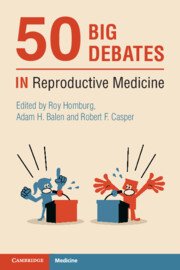Book contents
- 50 Big Debates in Reproductive Medicine
- Series page
- 50 Big Debates in Reproductive Medicine
- Copyright page
- Contents
- Contributors
- Foreword
- Introduction
- Section I Limits for IVF
- Section II IVF Add-ons
- 5A DHEA Is an Effective Treatment for Poor Responders
- 5B DHEA Is an Effective Treatment for Poor Responders
- 6A The Addition of LH/hCG to FSH Improves IVF Outcome
- 6B The Addition of LH/hCG to FSH Improves IVF Outcome
- 7A Acupuncture Is a Useful Adjuvant for Fertility Treatment
- 7B Acupuncture Is a Useful Adjuvant for Fertility Treatment
- 8A There Is a Role for Pre-conceptional Treatment with CoQ10
- 8B There Is a Role for Pre-conceptional Treatment with CoQ10
- 9A There Is a Role for Pre-conceptional Treatment with Vitamin D
- 9B There Is a Role for Pre-conception Treatment with Vitamin D
- 10A Natural Killer Cell Assay in the Blood Is a Useless Investigation
- 10B Natural Killer Cell Assay in the Blood Is a Useless Investigation
- 11A Intralipid Therapy Has a Place in Infertility Treatment
- 11B Intralipid Therapy Has a Place in Infertility Treatment
- 12A The Endometrial Scratch Has Had Its Day
- 12B The Endometrial Scratch Has Had Its Day
- 13A Corticosteroid Therapy Is Useful in Assisting Implantation
- 13B Corticosteroid Therapy Is Useful in Assisting Implantation
- Section III The Best Policy
- Section IV Embryology
- Section V Ethics and Statistics
- Section VI Male-factor Infertility
- Section VII Genetics
- Section VIII Ovarian Stimulation
- Section IX Hormones and the Environment
- Index
- References
13A - Corticosteroid Therapy Is Useful in Assisting Implantation
For
from Section II - IVF Add-ons
Published online by Cambridge University Press: 25 November 2021
- 50 Big Debates in Reproductive Medicine
- Series page
- 50 Big Debates in Reproductive Medicine
- Copyright page
- Contents
- Contributors
- Foreword
- Introduction
- Section I Limits for IVF
- Section II IVF Add-ons
- 5A DHEA Is an Effective Treatment for Poor Responders
- 5B DHEA Is an Effective Treatment for Poor Responders
- 6A The Addition of LH/hCG to FSH Improves IVF Outcome
- 6B The Addition of LH/hCG to FSH Improves IVF Outcome
- 7A Acupuncture Is a Useful Adjuvant for Fertility Treatment
- 7B Acupuncture Is a Useful Adjuvant for Fertility Treatment
- 8A There Is a Role for Pre-conceptional Treatment with CoQ10
- 8B There Is a Role for Pre-conceptional Treatment with CoQ10
- 9A There Is a Role for Pre-conceptional Treatment with Vitamin D
- 9B There Is a Role for Pre-conception Treatment with Vitamin D
- 10A Natural Killer Cell Assay in the Blood Is a Useless Investigation
- 10B Natural Killer Cell Assay in the Blood Is a Useless Investigation
- 11A Intralipid Therapy Has a Place in Infertility Treatment
- 11B Intralipid Therapy Has a Place in Infertility Treatment
- 12A The Endometrial Scratch Has Had Its Day
- 12B The Endometrial Scratch Has Had Its Day
- 13A Corticosteroid Therapy Is Useful in Assisting Implantation
- 13B Corticosteroid Therapy Is Useful in Assisting Implantation
- Section III The Best Policy
- Section IV Embryology
- Section V Ethics and Statistics
- Section VI Male-factor Infertility
- Section VII Genetics
- Section VIII Ovarian Stimulation
- Section IX Hormones and the Environment
- Index
- References
Summary
Implantation is a complex biological process and for the maternal tolerance of an antigenically different fetus, controlled inflammation and activation of immune response in the peri-implantation period is essential. Elevated follicular cortisol:cortisone ratio is associated with good follicular development, oocyte maturation and successful implantation. However, as the follicles are unable to biosynthesise cortisol, corticosteroid therapy has been tested and shown to improve clinical pregnancy in women having stimulated IVF/ICSI cycles. Corticosteroid gradient at the feto-maternal interface is essential and is facilitated by progesterone induced 11βHSD-I activity. In women with recurrent miscarriage, expression of 11βHSD-I in decidualising endometrium is blunted by high uterine natural killer (uNK) cell density, which also has a negative impact on decidualisation marker genes and endometrial cytokines, suggesting that local steroid deficiency leads to impaired decidualisation. Prednisolone has been shown to reduce uNK cell density and although a pilot RCT suggested possible clinical benefit, validation from larger trials is awaited.
Keywords
- Type
- Chapter
- Information
- 50 Big Debates in Reproductive Medicine , pp. 68 - 70Publisher: Cambridge University PressPrint publication year: 2021

